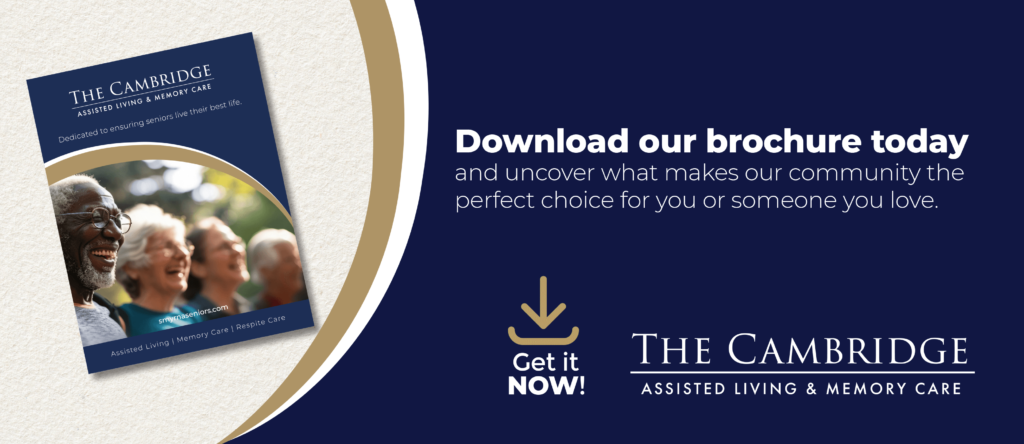We're Dedicated To Ensuring Seniors Live Their Best Life
Understanding the Differences: Independent Living, Assisted Living, and Memory Care

At this stage of your life, it’s time for a new adventure. Many dread getting older, fearing how they will adjust to life’s challenges as they age. Thankfully, you can be in the driver’s seat, making choices for your life that enable you to age gracefully while maintaining your independence.
In this article, you’ll gain a fundamental understanding of the key differences between independent living, assisted living, and memory care. It covers all the essential considerations for making the best choice for yourself or a loved one.
This choice should take into account health needs, financial resources, unique preferences, care needs, amenities, and activities that align with your lifestyle and health. Read on for a look at all three of these popular senior living options.
Your Future of Independent Living
If you ask seniors why they do not want to give up their homes, and if they think deeply about how they feel, the most common reason is that they do not want to give up their independence.
Independent living is designed for active seniors who manage their routine without assistance but want to simplify their lifestyle. This option is ideal for those who are active, self-sufficient, and looking to enjoy a maintenance-free lifestyle, without the responsibilities of homeownership. Communities provide access to social, recreational, and wellness opportunities, while managing chores like yard work, housekeeping, and laundry, so you can focus on enjoying life.
Think of independent living as a balance between autonomy and convenience, where you have access to attractive community amenities such as dining (with accommodations), exercise, and social activities.
Living options in an independent living community might include an apartment, condominium, or even a small cottage, all tailored to older adults. While medical care typically isn’t included in the basic services of independent living, many communities are located near healthcare providers for easy access to medical care if needed.
One goal of community living is to encourage people to socialize to avoid loneliness and reduce the work of maintaining their living space. This choice might be for you if you value your independence but also want to be part of a community that encourages socialization and engagement and positive activities for the mind and the body.
Independent Living Benefits
- No more household chores, woohoo! You can forget about home maintenance, fixing things, and constantly cleaning, and leave those boring daily tasks behind.
- Stay engaged with social activities while you make new friends through community outings, fitness classes, and game nights.
- For those on a limited budget, this choice may reduce your living expenses when compared to managing a household on your own.
- Maintain your privacy with a choice of various apartment sizes to go well with your needs and preferences.
This choice may be a good fit for active seniors who crave socialization but still want independence.
Another Choice is Assisted Living
Assisted living is designed for older adults who are looking for an independent lifestyle, with options for supportive care and services as needed. The option of assisted living might be ideal for you if you require some help with daily activities, such as bathing, dressing, medication management, meal preparation, and transportation.
While assisted living residents maintain a degree of independence, you may benefit from a personalized care plan designed for your specific needs. This plan may evolve over time to adapt to changes in your health or mobility.
Assisted living accommodations include private apartments, sometimes equipped with small kitchenettes to allow residents to prepare simple snacks or meals. Meals and community dining are an integral part of assisted living communities, emphasizing balanced nutrition as well as opportunities for residents to connect during mealtimes.
Many communities also provide life-affirming programs, such as yoga classes, art workshops, and day trips, aimed at nurturing both physical, mental, and emotional well-being. On-site supportive care, while not as comprehensive as care received in a memory care community or nursing home, is often available for those seeking assistance with daily living activities
Assisted Living Benefits
- Personalized Care gives support with everyday tasks such as bathing and medication management.
- 24/7 Staffing provides oversight, including regular safety checks and call-for-aid systems for emergency support, ensuring peace of mind for families and residents.
- An Accessible Environment offers easy-to-navigate living spaces for varying mobility levels
- Social Amenities let you enjoy book clubs, crafts, and other activities while still having your own private space.
This choice may be a good fit for seniors who value privacy but need consistent support to maintain a safe and fulfilling lifestyle.
Memory Care for Those Experiencing Cognitive Change
Memory care is a specialized type of assisted living that focuses on supporting individuals experiencing cognitive change, such as Alzheimer’s disease, dementia, and other memory-related issues. Staff in memory care communities are specifically trained to address the cognitive and emotional needs of residents managing the changes of memory loss. These communities are designed with safety in mind and feature secure environments to prevent wandering and confusion, as well as layouts conducive to ease of navigation.
Memory care residents benefit from supportive care services, 24/7 staffing, and structured routines, which can provide a sense of familiarity and stability. Activities are tailored to engage individuals with cognitive change, focusing on stimulating creativity, memory recall, and emotional connection.
You may enjoy music therapy, sensory-based exercises, and reminiscence therapy, which are common programs designed to spark joy and preserve cognitive function wherever possible. Additionally, many memory care communities employ smaller caregiver-to-resident ratios to ensure attentive care.
Memory Care Benefits
- A Specialized Team of caregivers trained in memory care provides tailored assistance.
- A Safe Environment creates a secure space to prevent wandering and ensure frequent supervision.
- Engagement Activities include programs designed to stimulate memory, like music therapy and memory games.
- A Community Connection promotes socialization, and routine helps improve emotional and mental health.
This choice may be a good fit for seniors with memory challenges who need a structured, supportive environment.

Key Differences to Help You Decide
The primary distinctions between independent living, assisted living, and memory care include the level of support available to residents and the services provided:
- Independent Living is primarily designed for maintenance-free living, offering convenience, amenities, and a socially-connected lifestyle, with less of an emphasis on personal care services.
- Assisted Living bridges the gap between independence and assistance by catering to seniors seeking support with essential activities and personal care needs.
- Memory Care, on the other hand, provides highly specialized and comprehensive support specifically designed for individuals with memory-related conditions.
Another significant difference is the cost:
- Typically, Independent Living is the most affordable option, as it includes fewer care-related services.
- Assisted Living communities often have higher costs than independent living due to the inclusion of personal care and support services.
- Memory Care communities offer a team of trained staff, enhanced security measures, and tailored care plans, resulting in monthly rates that are generally higher than those of traditional assisted living communities.
Other Factors to Consider When Choosing
When deciding which senior lifestyle is best for you, several other factors should be considered.
Health Needs
For seniors with significant health or cognitive challenges, assisted living or memory care may be necessary. However, those in good health with minimal personal care needs may benefit more from independent living. Your independence and care needs may change over time, so have a plan to accommodate these changes.
Level of Independence
Assessing your abilities is critical. Independent living is best for those who treasure independence, while assisted living suits those who wish to maintain their independence as long as possible with support as needed. Memory care is designed for individuals wanting to live with freedom and choice in a safe, secure environment, with access to supportive care, trained caregivers, and an engaging daily routine.
Social Engagement
Independent living supports your independence by offering a vibrant social life, while assisted living and memory care provides social opportunities tailored to various preferences, needs, and abilities.
Budget Wisely
Financial considerations are important. Senior living options vary significantly in cost. It is vital to evaluate costs in comparison to your available financial resources.
Future Needs
Planning for future changes in your health and care needs can ensure a smooth and successful transition. Many communities offer multiple levels of care, making it easier to transition as care needs change and evolve.
Continuum Communities and Flexibility
Some senior living communities offer a range of services, or a continuum of care, which integrates independent living, assisted living, and memory care in one convenient location or area. This flexibility allows residents to transition seamlessly between care levels as their needs evolve without leaving a familiar environment.
These continuum communities can be particularly beneficial for couples with differing health and independence levels, allowing them to stay close while receiving the specific support they require.
Emotional and Psychological Considerations
Few want to get old, yet we all do, so let’s make the best of our “golden years.” Transitioning to a senior living community—regardless of the level of care—can evoke a range of emotions for both seniors and their families.
For some, leaving behind a family home can be challenging. However, entering a community often relieves the burden of managing a home while also fostering a greater sense of camaraderie and reducing feelings of isolation. Families also experience peace of mind knowing that their loved one is in a safe, supportive environment.
It’s essential to approach the decision-making process with open communication and inclusivity. Discussing options with loved ones, touring communities, and carefully evaluating services can ease anxieties and pave the way for a transition that meets everyone’s expectations.
Be Empowered
Whether considering independent living, assisted living, or memory care, each option is a valuable choice in supporting seniors through different stages of aging. The right choice depends on your preferences, health needs, financial circumstances, and priorities for future planning. Whether you’re looking for more freedom, additional assistance, or specialized memory care, there’s an option tailored to meet your needs.
Exploring these options with a clear understanding of their benefits and distinctions empowers seniors and families to make informed, confident decisions that enhance their overall well-being and quality of life in their later years.
Ultimately, choosing a senior living option is not just about meeting practical needs—it’s about creating a home and lifestyle where you, or your loved ones, can thrive physically, emotionally, and socially. Reach out to us and start the conversation about senior living. Learn how the right senior living community can empower you to enjoy a safe, fulfilling, and meaningful life.

